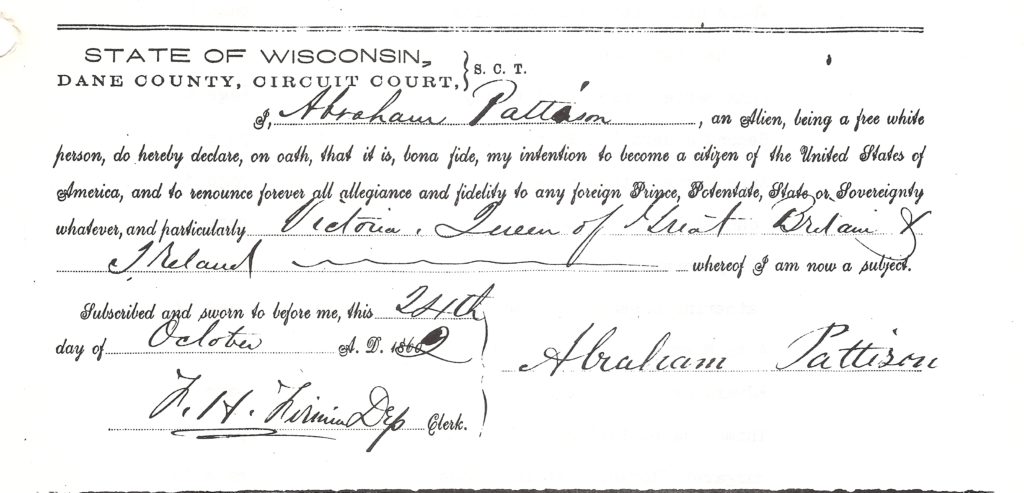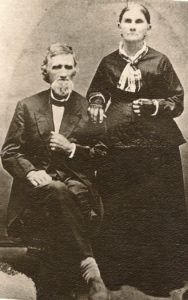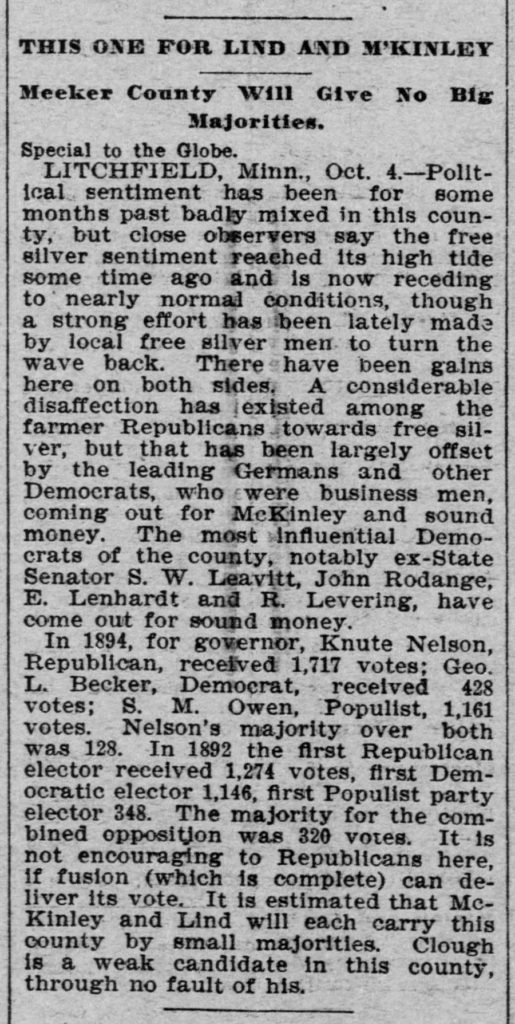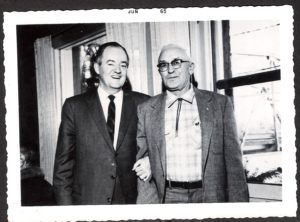Our ancestors were just as political as we are today. The issues may have changed—do you care more about currency backed by silver or about immigration and terrorism?—but voting is as important as ever. Since today is another monumental presidential election in the U.S., I thought I should write a short post about how genealogists can learn about the politics of our ancestors, using a few of my own relatives as examples.
The power of democracy
As the America nation expanded geographically during the 19th and 20th centuries, so too did the number of people who could vote. Through grassroots activism and the hard work of many individuals, earlier limits based on property, race, and gender gradually fell by the wayside. This ever-expanding democracy was one of the “pull”-factors that enticed millions of immigrants to the United States in the past two centuries. The immigration process can sometimes offer us our first tantalizing clues about our ancestors’ politics.
First of all, the date our ancestors left their homelands might suggest that they had a certain political affiliation in their native country. For example, 17th century migration from England to America happened in waves that were directly tied to changing political conditions in England: most notably the Separatist and Puritan migrations to New England between 1620 and 1640 and the Royalist “Cavaliers” who settled in Virginia during the English Civil War of 1642-51. Likewise, several German and Bohemian families in my ancestry left central Europe during the late 1840s and early 1850s, a time when political retribution was common after the failed revolutions of 1848. For people seeking a more liberal, democratic form of government, America was an obvious choice. If your ancestors were among these particular groups, you’ve got a good starting point for understanding how their political (and religious) beliefs fit into the context of their times.
I think it can also be suggestive to consider how long it took our immigrant ancestors to become U.S. citizens once they arrived. Some of them declared their intent to become a citizen within months after first setting foot on American soil. Others waited years, and some never even tried. Their haste (or not) in becoming a citizen gives us a clue to how engaged they were politically. Becoming a citizen meant earning the right to vote (if they were white and male, depending on the era). But just like today, some people were apathetic about participating.

Parties and issues
It is often quite difficult to know who our ancestors voted for or why. (Indeed, the secrecy of the ballot is one of its key features.) But sometimes you’ll stumble across a document that provides clear answers about their political opinions. Maybe you’ll be lucky enough to have ancestors in some of the few places for which voter rolls have been digitized. But even if you can’t find your ancestors in those records, you’ll probably still be able to learn something about their politics.

Some of our ancestors were outspoken about particular issues, and their views were recorded in newspapers or county histories. For example, one of my ancestors, Abel Dunham (1819-1899), was an outspoken abolitionist. His staunch Republicanism is noted in every county history sketch about Abel or one of his children. One sketch (of two) in Past and Present of Pike County, Illinois, reads in part:
Mr. Dunham was a prominent abolitionist, doing everything in his power to suppress slavery, and when the Republican Party was organized to prevent its further extension he became one of its stalwart advocates. Later he was again connected with a party of reform—the prohibitionist, for he was an earnest advocate of the cause of temperance and in fact his influence was ever given on the side of progress and improvement and for the amelioration of the hard conditions of human life.
Similarly, searching through newspapers I came across an article that helped me and my wife understand the political sentiments of her great-great-grandfather Erhardt Lenhardt (1844-1929). Lenhardt was a well-to-do immigrant brewer in Litchfield, Minnesota. Amidst the heated debates about currency leading up to the presidential election of 1896, Lenhardt was noted in the St. Paul Globe as one of the “influential Democrats” who had thrown their support behind Republican nominee William McKinley and the policy of “sound money.” It was an unusual position; most Democrats supported “free silver” that year. Indeed, “free silver” was the primary campaign issue for Democratic nominee William Jennings Bryan.
Why did Erhardt Lenhardt cross party lines with his support? As it turns out, Lenhardt had invested $15,000 in a municipal bond from the state treasury department in 1895. He had a lot to lose if the value of the state’s fixed interest payments were reduced by inflation. Thus, the picture comes into focus. As a businessman and investor—more specifically as a lender—Lenhardt risked losing money on his investment if a flood of new (silver-backed) currency entered the economy and depreciated the value of each dollar he was supposed to be repaid by the state. That was enough for him to overlook other Democratic policies he might have supported and Republican policies he may not have liked.

Political legacies
Political affiliations often pass from one generation to the next (although I’m sure we all know of counterexamples). One line on my Irish side voted Democratic for several generations, even as the party itself gradually moved from the right to the left on many issues. Abraham Pattison’s son Henry ran as a Democrat for Wisconsin state assembly from Pepin and Buffalo Counties in 1914. (He lost badly, receiving less than 15% of the vote.) As something of a consolation, two years later a Democratic senator named him postmaster for the city of Durand.
Some of Henry’s children and grandchildren were even more involved in the Democratic party. Henry’s grandson Basil Jordan (1902-1983), my great-grandfather, worked in St. Paul Union Stockyards in South St. Paul, Minnesota. He helped organize a labor union there. My grandmother remembers him hosting clandestine meetings at their house in St. Paul when she was a little girl. (The Twin Cities were a hot spot of labor activity during the 1930s, and the stakes were high.) Basil wasn’t a socialist or a Communist, just an everyday working-class Democrat who supported organized labor.

Basil’s brother Tom Jordan was raised by his grandparents Henry and Kate Pattison. As an adult, Tom was an active Democrat. He owned and operated the Prindle Inn in Durand, Wisconsin, and he sometimes invited Democratic politicians, including President Kennedy, to stay there. Finally, here is a picture of Henry Pattison’s youngest son Francis “Fal” Pattison with sitting Vice President Hubert Humphrey. I don’t know the story behind the photo, but the political affinity fits with what we know about the Pattison family.
Most of our relatives weren’t influential enough to be photographed with national political figures. Others, like journalists and judges, were ostensibly obligated to be keep their political views private. To give a final example using yet another Pattison, Henry and Kate’s son George Leo “Judge Lee” Pattison, spent 32 years as an elected judge in Buffalo County, Wisconsin. His job demanded impartiality, and George was proud of his track record. Though from a staunchly Democratic family, he was first appointed by a Republican governor. Perhaps most suggestive of his impartiality, he never had a decision overturned by the state supreme court.
To sum up this post, celebrate the fact that we live in a democracy and that you have the right to vote. Then get out and find the compelling political stories in your family’s past. What issues mattered to your ancestors? Did any of them run for or hold elected offices? Can you figure out for whom they voted and why? It’s a fascinating search, and it’s less trivial than it first appears. I think it helps inform the present. Most of us have ancestors with a wide range of political beliefs. (On my dad’s side are relatives who have been Republicans for as long as the Pattisons have been Democrats.) Just like today, it is more useful to try to understand why these people valued what they valued than to dismiss them out of hand for belonging to a particular political party.
